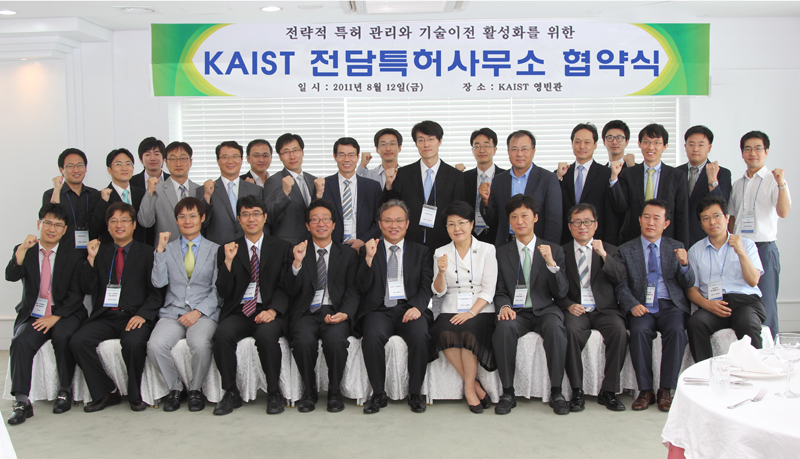policy
KAIST’s Industry-University Collaboration Team started the operation of 20 specialized patent offices in order to improve the efficiency and specialty of patenting and commercialization of research results of KAIST. With the start of the operation of the patent offices, KAIST now has laid the groundwork for creating patent rights and improved patent use through improving services for technology developers and inventors.
The patent offices will offer various types of support related to patent rights and technology transfer by providing services such as interviews with inventors, preliminary reviews of technologies, and evaluations to find the invented technology patents worthwhile.
KAIST overwhelmingly outpaced other universities in the nation and ranked the “number one research university” in patent ownerships. According to the Korean Intellectual Property Office that investigated the number of patents domestic universities had acquired over the period of 5 years from 2006 to 2010, KAIST had 4,403 patents and was named the first in the fields of information and communication, electric materials and semiconductors, electronic circuit, automobile, and inorganic chemistry.

-
event KAIST GESS Team Awarded Honorable Mention at 2025 Entrepreneurship Olympiad
<Photo: eaureco team at the final pitch> The KAIST Global Entrepreneurship Summer School (GESS) winning team, eaureco, earned an Honorable Mention at the 2025 Entrepreneurship Olympiad, held July 21–23 at Stanford Faculty Club and hosted by Techdev Academy. Competing in the college track, the team showcased their innovative solution among participants from top institutions including Stanford University, UC Berkeley, UCLA, and UC San Diego. Team eaureco—comprising KAIST un
2025-07-29 -
research KAIST Enables On-Site Disease Diagnosis in Just 3 Minutes... Nanozyme Reaction Selectivity Improved 38-Fold
<(From Left) Professor Jinwoo Lee, Ph.D candidate Seonhye Park and Ph.D candidate Daeeun Choi from Chemical & Biomolecular Engineering> To enable early diagnosis of acute illnesses and effective management of chronic conditions, point-of-care testing (POCT) technology—diagnostics conducted near the patient—is drawing global attention. The key to POCT lies in enzymes that recognize and react precisely with specific substances. However, traditional natural enzymes are expe
2025-07-29 -
research Better Sleep, Better Life — KAIST’s Sleep Algorithm Comes to Samsung Galaxy Watches
<Professor Jae Kyoung Kim of KAIST's Department of Mathematical Sciences> Did you know that over 80% of people worldwide have irregular sleep habits? These sleep issues don’t just leave us feeling tired — they affect our health, focus, and quality of life. Now, a new sleep algorithm developed by a team of Korean researchers is aiming to change that. And it’s available on Samsung Galaxy smartwatches around the world, including the newly launched Galaxy Watch8 series. T
2025-07-28 -
research Vulnerability Found: One Packet Can Paralyze Smartphones
<(From left) Professor Yongdae Kim, PhD candidate Tuan Dinh Hoang, PhD candidate Taekkyung Oh from KAIST, Professor CheolJun Park from Kyung Hee University; and Professor Insu Yun from KAIST> Smartphones must stay connected to mobile networks at all times to function properly. The core component that enables this constant connectivity is the communication modem (Baseband) inside the device. KAIST researchers, using their self-developed testing framework called 'LLFuzz (Lower Layer Fuzz)
2025-07-25 -
research Immune Signals Directly Modulate Brain's Emotional Circuits: Unraveling the Mechanism Behind Anxiety-Inducing Behaviors
KAIST's Department of Brain and Cognitive Sciences, led by Professor Jeong-Tae Kwon, has collaborated with MIT and Harvard Medical School to make a groundbreaking discovery. For the first time globally, their joint research has revealed that cytokines, released during immune responses, directly influence the brain's emotional circuits to regulate anxiety behavior. The study provided experimental evidence for a bidirectional regulatory mechanism: inflammatory cytokines IL-17A and IL-17C act
2025-07-24